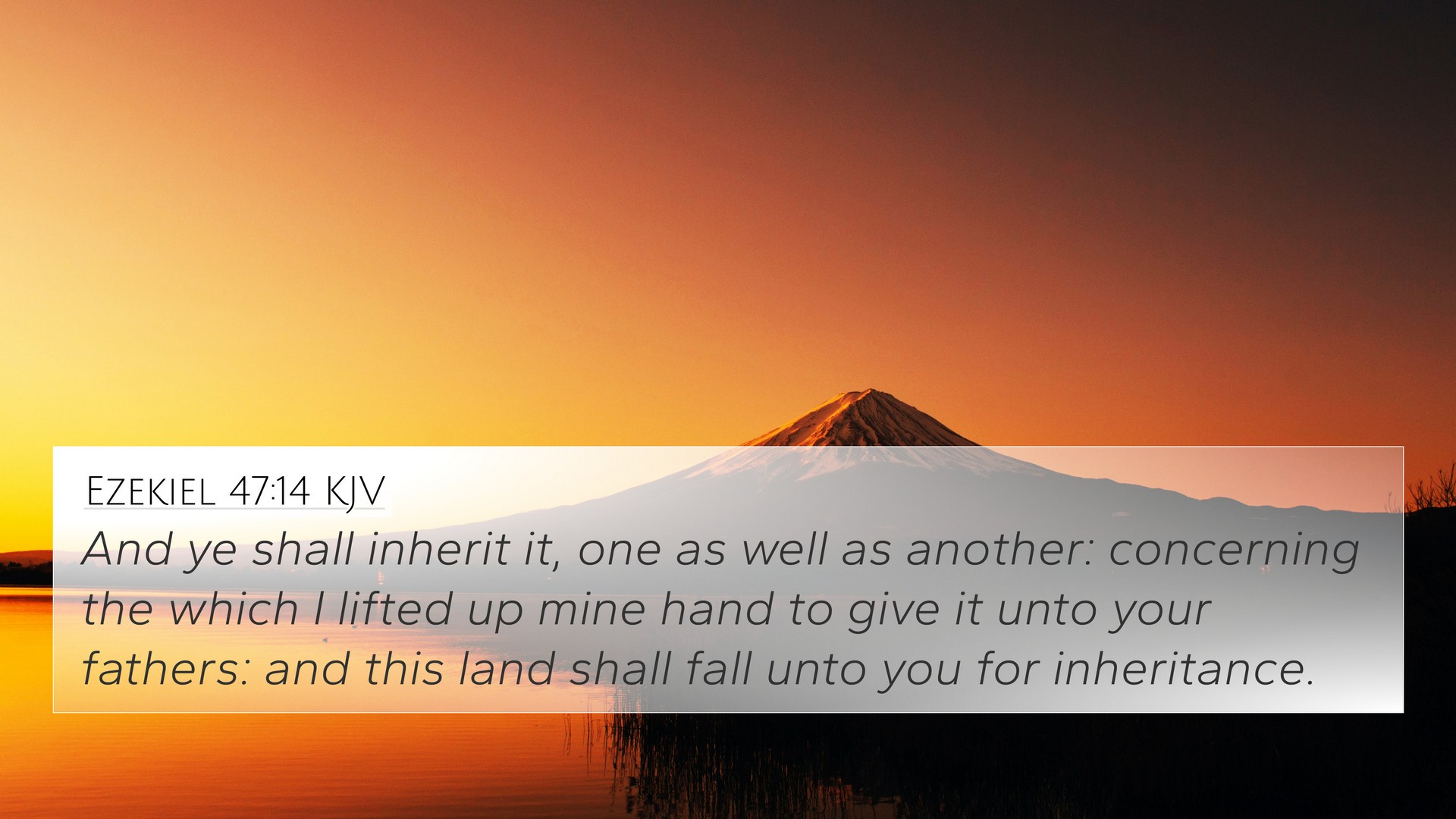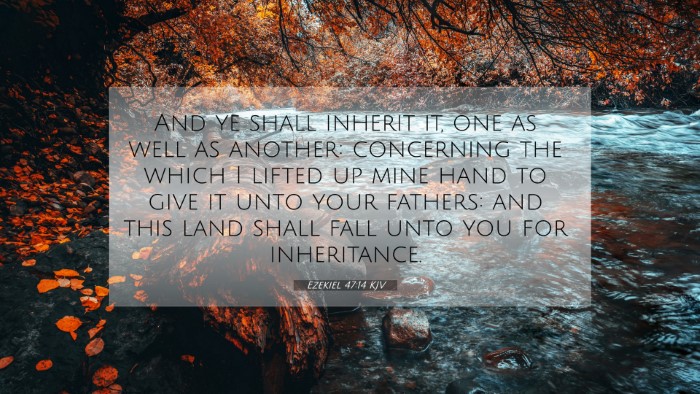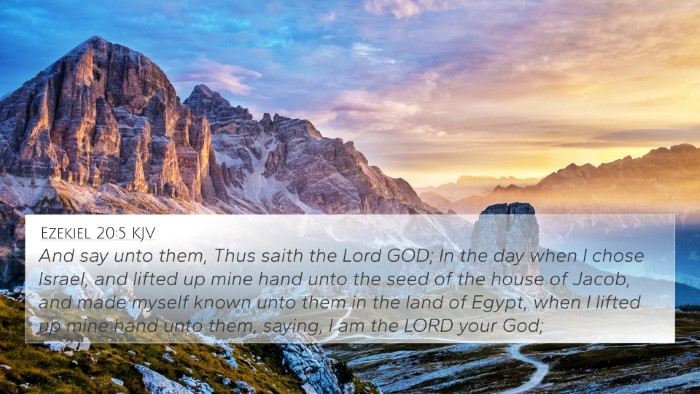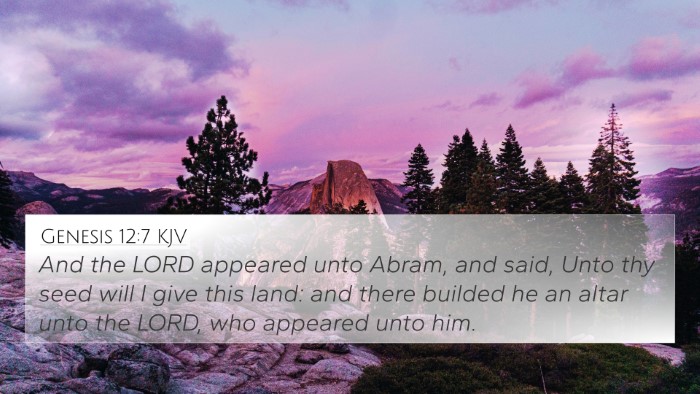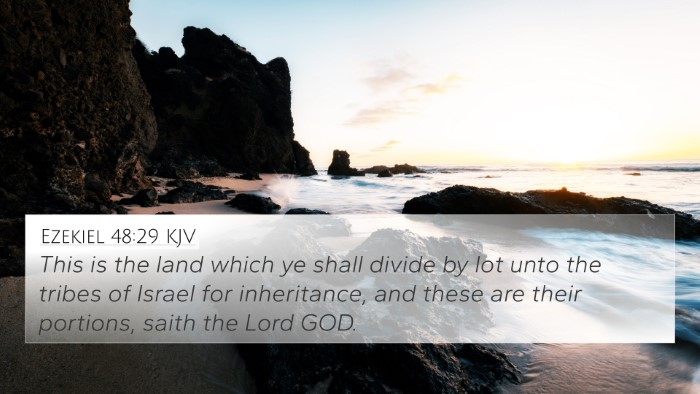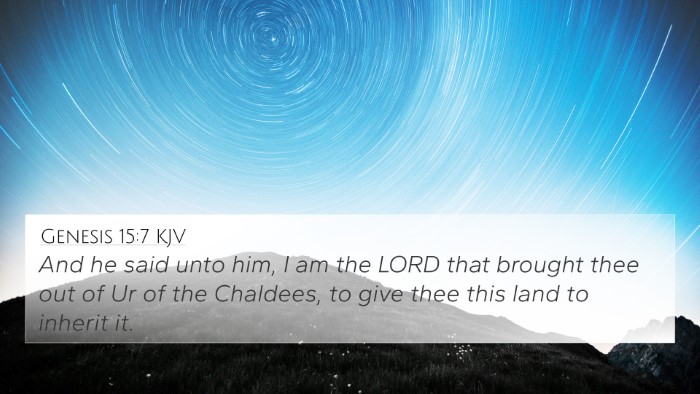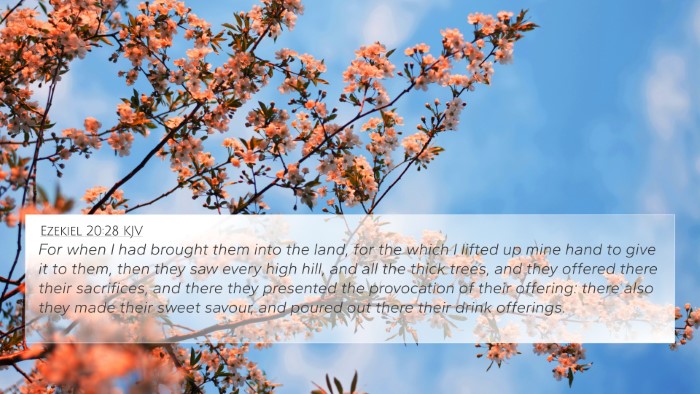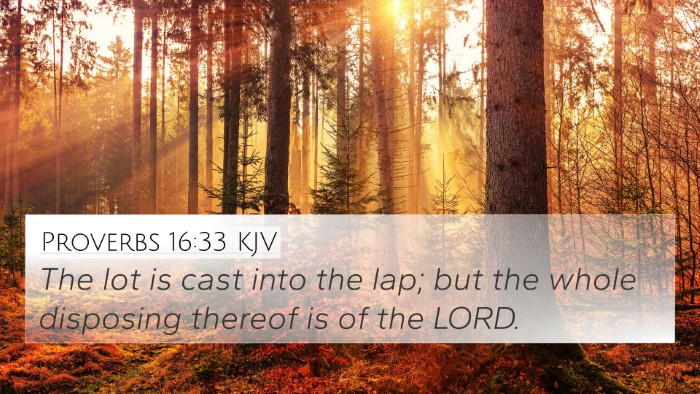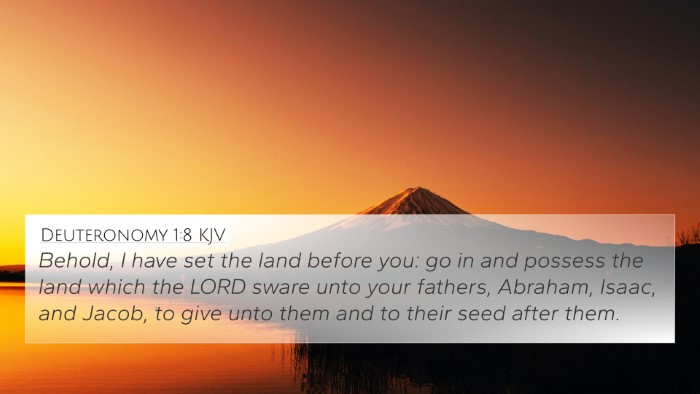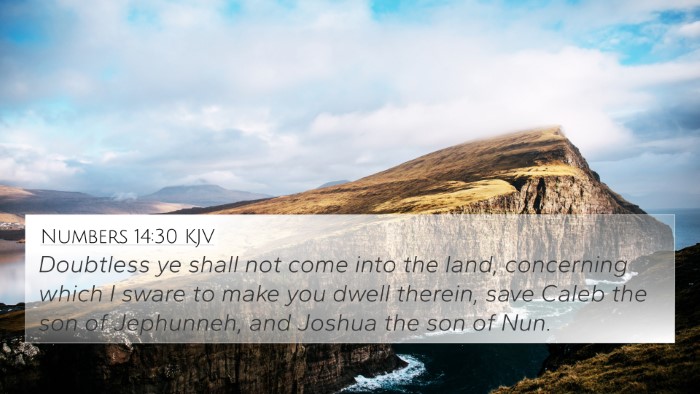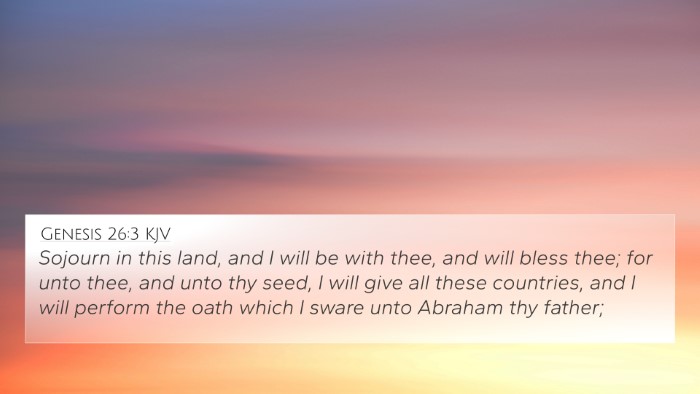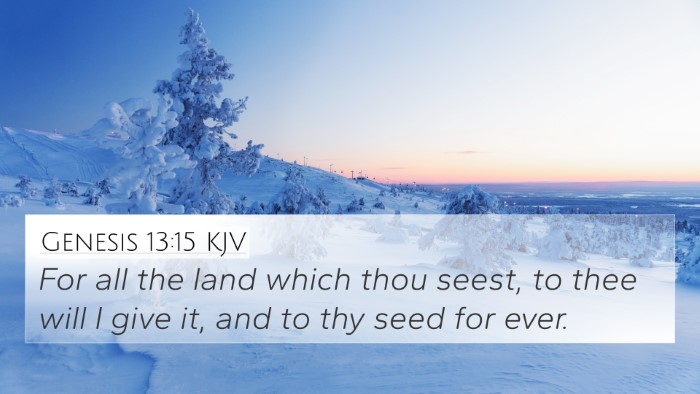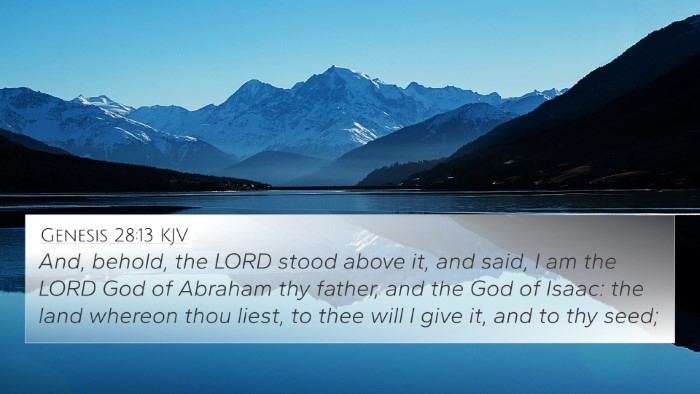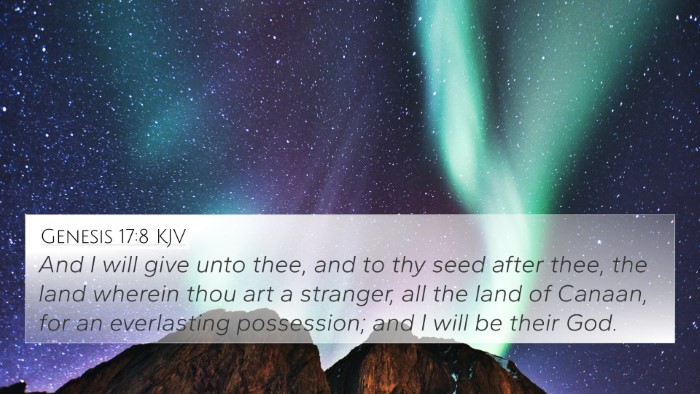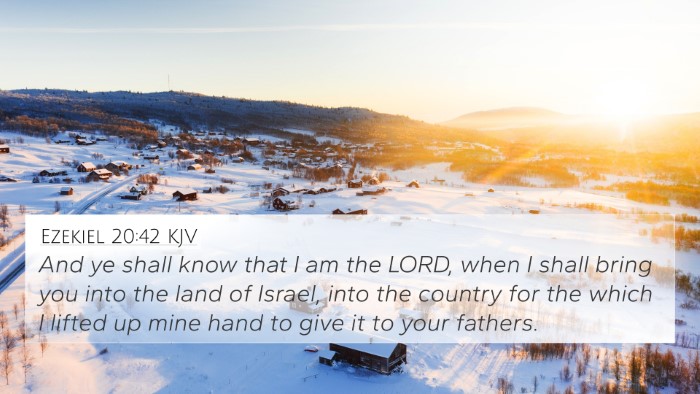Ezekiel 47:14 - Meaning and Interpretation
Ezekiel 47:14 states, "And ye shall inherit it, one as well as another: concerning the which I lifted up mine hand to give it unto your fathers: and this land shall fall unto you for inheritance." This verse reflects the promises made by God to the people of Israel regarding their inheritance of the Promised Land. The implications of this verse address themes of divine promise, unity among God's people, and the fulfillment of God's covenant.
Contextual Overview
This passage occurs towards the end of the book of Ezekiel, which is primarily focused on visions concerning the restoration of Israel after exile. The previous chapters detail the dimensions of the future temple, the returning glory of God, and the re-establishment of Israel's identity as God's chosen people.
Summarized Insights from Commentaries
Matthew Henry's Commentary
Matthew Henry emphasizes the significance of the land inheritance being a direct result of God's covenant with the fathers of Israel. He highlights that God's promise adds assurance to the people's hope, stating that all the tribes will have equal shares. This not only symbolizes physical allocation but also the spiritual unity and equality among believers.
Albert Barnes' Notes
Albert Barnes points out that this inheritance signifies the blessings that come from God, affirming the idea that the land is given freely according to God’s sovereign will. He also discusses how the lifting of God's hand signifies a strong affirmation of this promise, implying a historical context of faithfulness despite Israel's previous unfaithfulness.
Adam Clarke's Commentary
Adam Clarke provides a detailed analysis of the term "inherit" as it relates to the people's identity and security in the land promised to them. He argues that inheriting the land represents not just physical possession but also the manifestation of God’s presence among His people. Clarke relates this back to broader theological themes of redemption and restoration as depicted throughout Scripture.
Key Themes and Connections
- Divine Promise: The assurance of God's promise to the patriarchs emphasizes His faithfulness. This serves as a foundational element in the narrative of God’s dealings with His chosen people.
- Unity of the Tribes: The equal inheritance among the tribes signifies the unity and shared identity of Israel, a theme prominent in both the Old and New Testaments.
- Fulfillment of Covenant: This verse encapsulates the overarching narrative of God fulfilling His covenant commitments with Abraham, Isaac, and Jacob, thus connecting to the broader biblical theme of covenant fidelity.
Bible Verse Cross-References
The following verses parallel the themes present in Ezekiel 47:14:
- Deuteronomy 12:10-11: Discusses the promise of inheriting the land after defeating their enemies.
- Joshua 14:1-2: Relates to the distribution of land among the tribes of Israel.
- Romans 8:17: Highlights the concept of inheritance among believers through faith.
- Hebrews 11:9-10: Reflects on the faith of Abraham in seeking a heavenly inheritance, paralleling the earthly inheritance theme.
- Matthew 5:5: Blessed are the meek, for they shall inherit the earth, connecting the New Testament fulfillment of promise.
- Psalms 37:11: The meek shall inherit the land, reinforcing the theme of inheritance.
- Revelation 21:3-4: The ultimate inheritance of God dwelling among His people in the new creation.
Thematic Bible Verse Connections
This verse not only holds significance in its immediate context but also resonates with various themes throughout Scripture. The integrity of God's promises across the Testaments can be seen in:
- Faithfulness: Throughout the scripture, God's unwavering commitment to His promises is a frequent theme.
- Restoration: The idea of restoring Israel and its people is a common narrative throughout the prophetic texts.
- Inheritance: The notion of inheritance is pivotal, echoing both physical and spiritual themes in topics of salvation and God's promises to His people.
Cross-Referencing and Comparative Analysis
Engaging in Bible cross-referencing allows readers to deepen their understanding of biblical themes and connections. By utilizing tools such as a bible concordance or bible cross-reference guide, one can discover the intricate links between verses that underscore the unity of Scripture.
- Investing time in cross-reference Bible study methodologies can elucidate the interconnectedness amongst the texts.
- Identifying connections between Old and New Testament scriptures can provide clarity on themes of fulfillment and continuity of God's plan.
- Using a comprehensive set of bible reference resources can help in defining and exploring profound theological concepts drawn from the canon.
Conclusion
In conclusion, Ezekiel 47:14 serves as a reminder of God's faithful promises to His people and the themes of inheritance, unity, and restoration. By engaging with this text alongside other relevant scriptures, readers can cultivate a deeper understanding of God's covenantal relationship with humanity. This verse stands as a beacon of hope, affirming that God's promises endure and will come to fruition in His perfect timing.
